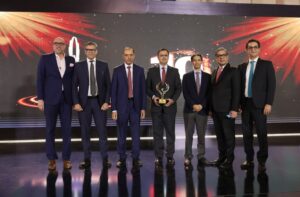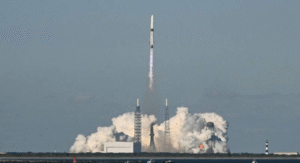Nvidia CEO Jensen Huang Warns: Blocking China from U.S. AI Chips “Hurts Us More”
Huang urges balanced policy to keep American AI leadership intact
Nvidia CEO Jensen Huang has warned that continued restrictions on U.S. AI chip sales to China could backfire, undermining America’s dominance in artificial intelligence innovation and global market share.
Speaking at a company event in Washington, D.C., Huang emphasized that while U.S. national security concerns are valid, cutting off access to Chinese developers could have long-term negative consequences for Silicon Valley’s leadership in AI technology.
“We want the world to be built on the American tech stack,” Huang told reporters. “But we also need to be in China to win their developers. A policy that causes America to lose half of the world’s AI developers is not beneficial long term — it hurts us more.”
AI tensions ahead of Trump–Xi meeting
Huang’s remarks come just ahead of a high-stakes meeting between U.S. President Donald Trump and Chinese President Xi Jinping, where AI technology and semiconductor exports are expected to be major discussion points.
Currently, Nvidia’s advanced AI chips are not sold in China, following multiple U.S. export restrictions and China’s retaliatory trade policies. These curbs were introduced over national security fears that China could use U.S.-made semiconductors to gain a military or cyber advantage.
In response, China has accelerated efforts to build its domestic chip industry, aiming to achieve semiconductor self-sufficiency and bypass U.S. supply chains altogether.
The economic dilemma: balancing power and innovation
Huang argued that a blanket ban on chip sales could stifle collaboration with China’s vast AI ecosystem, which includes millions of developers, researchers, and startups.
He cautioned that the U.S. risks losing access to a critical portion of the global innovation base, ultimately weakening its own companies.
“This perspective… that hurting them helps us… is misguided,” Huang said. “We need to engage with global AI developers to sustain innovation and leadership. Shutting them out hurts the ecosystem as a whole.”
Huang noted that he had previously advocated this approach during the Biden administration but said his arguments had been overshadowed by growing bipartisan pressure in Washington to tighten AI technology exports.
Trump administration signals a more “nuanced” policy
Reports suggest the Trump administration may consider a more flexible framework for AI chip exports to China — allowing limited sales under strict oversight — in contrast to the broader bans enforced in previous years.
However, such an approach faces opposition from China hawks in both U.S. political parties, who argue that easing restrictions could risk sensitive technologies falling into the hands of Chinese defense-linked firms.
Industry analysts note that Nvidia’s warning highlights a central dilemma for U.S. policymakers: how to maintain technological superiority without isolating key global markets that drive AI innovation.
As the global AI race intensifies, Huang’s comments underscore the tension between security, economics, and innovation, urging Washington to adopt a strategy that protects U.S. interests without alienating half the world’s AI talent.













